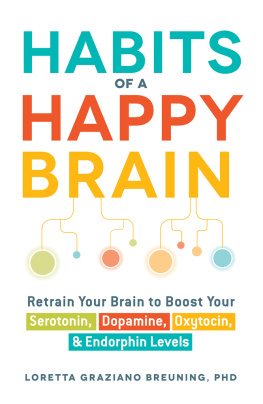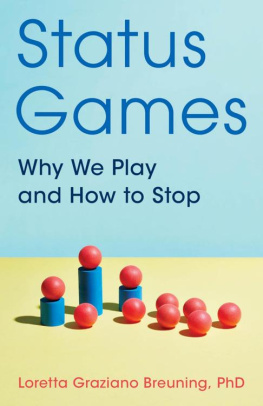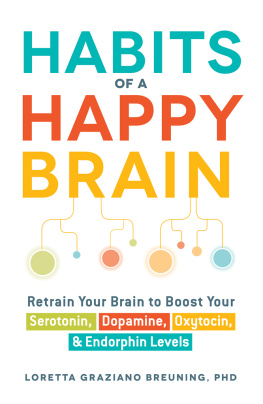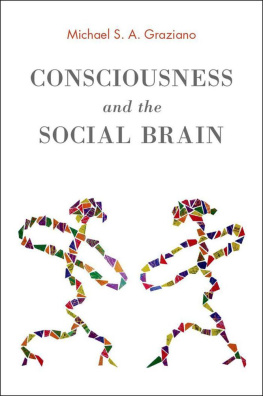Loretta Graziano Breuning - Beyond Cynical: Transcend Your Mammalian Negativity
Here you can read online Loretta Graziano Breuning - Beyond Cynical: Transcend Your Mammalian Negativity full text of the book (entire story) in english for free. Download pdf and epub, get meaning, cover and reviews about this ebook. year: 2013, publisher: Inner Mammal Institute, genre: Romance novel. Description of the work, (preface) as well as reviews are available. Best literature library LitArk.com created for fans of good reading and offers a wide selection of genres:
Romance novel
Science fiction
Adventure
Detective
Science
History
Home and family
Prose
Art
Politics
Computer
Non-fiction
Religion
Business
Children
Humor
Choose a favorite category and find really read worthwhile books. Enjoy immersion in the world of imagination, feel the emotions of the characters or learn something new for yourself, make an fascinating discovery.
- Book:Beyond Cynical: Transcend Your Mammalian Negativity
- Author:
- Publisher:Inner Mammal Institute
- Genre:
- Year:2013
- Rating:3 / 5
- Favourites:Add to favourites
- Your mark:
- 60
- 1
- 2
- 3
- 4
- 5
Beyond Cynical: Transcend Your Mammalian Negativity: summary, description and annotation
We offer to read an annotation, description, summary or preface (depends on what the author of the book "Beyond Cynical: Transcend Your Mammalian Negativity" wrote himself). If you haven't found the necessary information about the book — write in the comments, we will try to find it.
Beyond Cynical: Transcend Your Mammalian Negativity — read online for free the complete book (whole text) full work
Below is the text of the book, divided by pages. System saving the place of the last page read, allows you to conveniently read the book "Beyond Cynical: Transcend Your Mammalian Negativity" online for free, without having to search again every time where you left off. Put a bookmark, and you can go to the page where you finished reading at any time.
Font size:
Interval:
Bookmark:

Is something wrong with the world?
It's natural to find fault with the world. Our brains evolved to scan for problems because that helps avoid them. The brain equates social threats with physical threats. Disappointment is inevitable in this brain weve inherited because its always seeking rewards. With a brain like this, its not surprising that people get cynical.
But you can transcend this natural negativity. You can see more than flaws when you look at the world. This book shows how. It takes no positions on issues. It simply shows how cynical thought habits get built, and how you can re-wire yourself to go beyond them.
The feeling that something is wrong comes from brain structures common to all mammals. This mammal brain responds to the world by releasing brain chemicals that tell you what is good for you and what is bad. Your inner mammal defines that in a quirky way. In the state of nature, things that feel good are good for survival, and things that feel bad threaten survival. Your mammal brain is always looking for ways to feel good and avoiding what it expects to feel bad.
Cynicism is one way to feel good. It stimulates dopamine by making the world seem predictable (I knew the idiots in power would mess this up.). Cynicism stimulates oxytocin by building social bonds (We are all hurt by these stupid policies.). Cynicism stimulates serotonin by putting you in the one-up position (Im ethical and smart compared to the jerks who are running things.)
When a mammal sees a threat or obstacle, it releases cortisol. That feels so bad that a mammal is motivated to do something to make it stop. Cynicism is one way to do something. Its a way to fight or flee without the drawbacks of actually fighting or fleeing. Anything that relieves a threat feels good to your mammal brain.
Mammals dont rely on hard-wiring. We build our circuits from early experience. Anything that triggered your brain chemicals in youth paved neural pathways that tell you how to get rewards and avoid threats in the future. We can easily wire ourselves to seek relief in cynicism.
The electricity in your brain flows like water in a storm, finding the path of least resistance. Each brain expects to meet its needs by doing what worked before. When the world fits your expectations, electricity lights up the pathway to your happy chemicals. When expectations are disappointed, cortisol is released, which tells you something is wrong with the world.
You can build new pathways to see the world in new ways. Instead of seeing a world that fails to meet your expectations, you can understand your inner mammals quest for predictability, trust, and social dominance. The world does not always give you social and physical rewards in ways you can predict. Frustration is inevitable in a mammals life. You can manage frustration with cynicism, or you can go beyond it.
A mountain goat thrives because it focuses on its footing instead of the ominousness of the mountain. You can wire yourself to focus on your footing. This book provides a way to do that in six weeks, with just a few minutes a day.
I used to be cynical. I was good at seeing whats wrong with the world. Then I realized it was just a pathway in my brain, and I built a new pathway. Im glad I did!
Beyond Cynical
Transcend Your Mammalian Negativity

copyright 2013 by Loretta G. Breuning
2nd edition
all rights reserved
ISBN-13: 978-1-941959-02-2
contact:
more books by Loretta G. Breuning, PhD
Meet Your Happy Chemicals
Dopamine, Endorphin, Oxytocin, Serotonin
I, Mammal
Why Your Brain Links Status and Happiness
Greaseless
How to Thrive without Bribes in Developing Countries

Inner Mammal Institute
Human moods and motivations are caused by brain chemicals inherited from earlier animals. These chemicals evolved to promote survival, not to make you happy all the time. You can stimulate more of the happy chemicals when you know how they work in the state of nature. The Inner Mammal Institute offers books, free resources, and coaching options that can help. Transcend the disease-based view of the brain and embrace the nature in human nature. Sign up for the monthly newsletter, Private Lives of Primates, at:
www.innermammalinstitute.org
for Robert Ardrey,
who found the truth about
mammals long ago
We are not fallen angels
but risen apes.
Table of Contents
1. Why Cynicism Feels Good
Apes pull their own hair out.
Huge patches of hairless skin got my attention when I visited the bonobos at the Valley of Monkeys (Le Vall des Singes) in France. I asked a zookeeper what was wrong.
They do it to themselves, the young man told me. They arrived here with the habit.
From where? I asked, expecting a traumatic tale of capture and confinement.
The keeper said the habit went so far back that its origins are unknown. The babies start doing it when they see their mothers doing it. Then they cant stop.
I was horrified at the thought of innocent children embarking on a life of pain.
The keeper walked away, but then turned over his shoulder and said, theyll stop eventually.
The sight of all that raw skin unnerved me. Suffering gets our attention. We want it to stop now instead of waiting for generations. Its easy to get cynical when problems persist. If we were causing our own suffering, we would want to know.
A shitty world
Dog poop was a common sidewalk hazard when I was young. Today, scooping up after your dog is the norm where I live. Sometimes theres an oops, and people get mad. Whos the jerk? they say. What is wrong with this world!
A smelly mess makes people unhappy, but eliminating the mess never made people happy. The habit of scooping up after dogs is an enormous achievement. Not so long ago, no one would have imagined we could wipe out dog poop in our time. When we did it, no one celebrated. Indeed, we hardly noticed. When 80% of dogs mess the streets, its just accepted as the way things are. But when 20% of dogs let loose, it feels like something is wrong with this world.

A smelly mess makes people unhappy, but eliminating the mess never made people happy. When an oops happens, it feels like something is wrong with the world.
Not long ago, 80% of the worlds leaders held power by imprisoning or killing their rivals. Now, closer to 20% of leaders imprison or kill their political rivals, and it feels like a crisis.
In the past, many people beat their children and it was accepted as the way things are. Today, a few people beat their children and it feels like a crisis.
Im not saying we should ignore these problems. But a constant sense of crisis obscures the rest of the story. You may think a sense of crisis is the only option for a smart, caring person. Consider the opposite: the desire to be smart and caring motivates us to look for the bad in the world. That builds neural pathways which make it easier to see more bad things. We skim over good things and suffer more than necessary.
You can be a smart, caring person without terrorizing yourself about the state of the world. You can transcend the negativity that comes naturally to the mammal brain. This book shows how.
Next pageFont size:
Interval:
Bookmark:
Similar books «Beyond Cynical: Transcend Your Mammalian Negativity»
Look at similar books to Beyond Cynical: Transcend Your Mammalian Negativity. We have selected literature similar in name and meaning in the hope of providing readers with more options to find new, interesting, not yet read works.
Discussion, reviews of the book Beyond Cynical: Transcend Your Mammalian Negativity and just readers' own opinions. Leave your comments, write what you think about the work, its meaning or the main characters. Specify what exactly you liked and what you didn't like, and why you think so.











